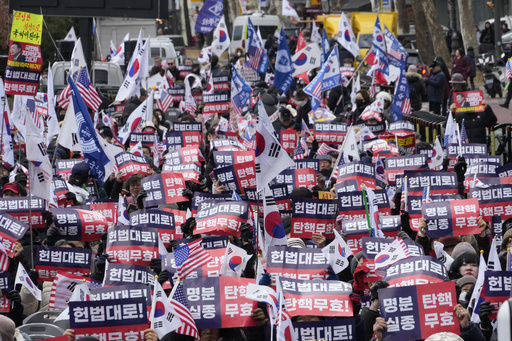In Seoul, South Korea, the embattled President Yoon Suk Yeol, facing an impeachment trial, made a fervent appeal to the Constitutional Court defending his controversial enforcement of martial law. This move, he argued, was necessary to bring to light the dangers posed by the opposition-controlled parliament, with promises of pursuing political reforms upon his potential reinstatement.
Addressing the court as it concluded its sessions, Yoon conveyed his stance, with the judiciary anticipated to deliver a verdict by mid-March regarding his presidential future. The trial follows a tumultuous period triggered by Yoon’s martial law declaration on December 3. This decision instigated severe political instability, negatively impacted financial markets, and blemished South Korea’s international reputation.
Yoon’s presidency, aligned with conservative values, was abruptly challenged by the liberal-majority National Assembly, which impeached him over these actions. Consequently, he also faced arrest and a rebellion charge, with potential severe penalties, including life imprisonment or execution, looming over him if convicted. Despite these charged circumstances, Yoon maintains innocence, pointing fingers at the Democratic Party for exacerbating the crisis by obstructing his governance and budgetary measures.
Highlighting his martial law rationale, Yoon insisted, “The decision was born out of a pressing need to address a fundamental crisis afflicting our nation,” attributing the turmoil to the opposition’s “anti-state” conduct. His tactical military deployment to the assembly intended to enforce order led to a contentious rejection and subsequent nullification of his decree by the legislators.
He refuted allegations of attempting to disrupt the legislative process, asserting that military mobilization aimed to ensure stability. However, testimonies from some military commanders contradicted his claims, stating that Yoon directed them to evict legislators to prevent martial law annulment.
Opposing viewpoints within the courtroom were vocally represented by Democratic Party member Jung Chung-rai, who argued for Yoon’s expulsion, citing his unconstitutional act of leveraging armed forces against the assembly during a non-crisis period. Jung criticized Yoon’s actions as subversive to public order and called for his immediate removal to reorient South Korea’s political trajectory.
The nation remains deeply divided, with considerable public demonstrations both advocating for and against Yoon in the streets of Seoul and beyond, signaling an entrenched societal split. The impending ruling from the Constitutional Court is poised to deepen this divide, regardless of the outcome. If Yoon is ousted, South Korea will be compelled to organize a national election to elect his successor within two months.
In a courtroom testimony extending over an hour, Yoon expressed a commitment to spearheading constitutional reforms to amend the current presidential framework if reinstated. He expressed openness to possibly vacating his position before completing his five-year term, set to end in 2027, as a gesture toward significant political reform.
Whether or not Yoon’s declarations will sway judicial opinion remains uncertain. The current political system, which allows presidents a single five-year term, was instituted in the late 1980s to curtail recurring military dictatorships. Despite Yoon’s controversial approach, it has rekindled discussions about potential systemic overhauls, with some advocating for a parliamentary or semi-presidential system to better distribute executive power.




